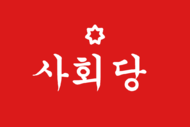Socialist Party (Sabia and Verona)
Socialist Party | |
|---|---|
 | |
| Founder | Napoléon Bleuberrie |
| Founded | 2012 |
| Dissolved | 2014 |
| Preceded by | PCJ PSCD |
| Merged into | Left Alliance |
| Headquarters | 2nd District, Salisse |
| Ideology | Socialism Regionalism Bleuberrism |
| Political position | Left-wing |
| Colors | Red |
The Socialist Party (Old Sabian: Cocjəłicmık Mekən; Modern Sabian: sosiedañaki), commonly known as the Sahoedang ("Socialist Party" in Korean) was a left-wing political party in Sabia and Verona founded by Napoléon Bleuberrie that dominated the nation's politics for a short period during its early history. In 2014 it merged with the Communist Party of Sabia and Verona to form the Left Alliance.
Until late 2013, the party was considered the main political organisation of the region, having ruled since the creation of Sabia and Verona. The main reasons for the Party's creation was the disagreement with the Christian and orthodox communist tendencies of the existing Juclandian political organisations.[1]
It was a democratic socialist, secular and regionalist party that followed the doctrine of Bleuberrism, a leftist political ideology based on the ideas, programs and government style of Napoléon Bleuberrie, the party's founder and Sabia and Verona's first Prime Minister. Today, Bleuberrism is, to a minor degree, espoused by the National Artists' Guild, one of the three major political parties of modern Sabia and Verona.
History

The Socialist Party (Sahoedang in Korean) was founded on October 26, 2012, by Napoléon Bleuberrie and his closest followers, as successor to the Sabia and Verona People's Movement, the left-wing political group that founded the region. The creation of the new semi-independent party was due to the contrasts in ideologies and beliefs with other left-wing parties in Juclandia, the Social Democratic-Christian Party and the Communist Party of Juclandia. The Sahoedang took ideologies from the SDCP and adopted members from the Communist Party in order to unite all left-wing advocates in Sabia and Verona in one Sabioveronese party.
The creation of the party was announced officially at the 3rd Assembly of Meeting of the Courts of Sabia and Verona on October 26, 2012. All PCJ and SDCP members of the Courts were reintroduced as Sahoedang members, and the party soon achieved support within the region.
The Sahoedang however became the Cocjəłicmık Mekən with the language reform of December 2012 impulsed by Socialist members in the Courts.[2] During this time, it strengthened in the government while the people grew dislike towards the party's reforms and policies.
It suffered a major hit when it lost the December 2012 elections against Osez Kóvérsz and the Unity Party.[3] It lost the majority in the Courts and remained with 9 seats out of 20 only. The party however remained as one of the most popular political organisations in the region.
In January 2013, the party was involved in a controversy when it was revealed party members were secretly giving political aid and government intrusion through the People's Cabinet to the Free Suyu Front and its leader, fugitive Hidram Cerwyn. Party leader Napoléon Bleuberrie was charged, but released after being declared innocent. This move would later be considered part of Bleuberrie's intrusion in the Sabioveronese justice system.
For the May 2013 general election, the Socialist Party nominated Bleuberrie in Salisse. Bleuberrie's campaign was characterized for being harsher and more aggressive against the right-wing than before. For May Day, the Socialist Party striked in Salisse and signs supporting Bleuberrie were shown. Finally, Bleuberrie won the election with 31.8% of the votes,[4] earning 10 seats in the Legislative Courts. Bleuberrie and his cabinet (now a mixed one, in contrast to first cabinet) took office on June 1, 2013.

The Socialist Party's presence in the Sabioveronese government however lasted little, as Bleuberrie marked the end of his government in a failed self-coup on 25 July, that ended in Bleuberrie and his supporters from the Armed Forces being arrested and put to trial by the Commission for the Preservation of Democracy. Following Bleuberrie's detention, party vice-president Pomme-Gabrielle Gauvier became the party's president, and his wife and party General Secretary Ülla F. Müller became the vice-president. In August 2013, the Communist Party of Sabia and Verona (KMCW) separated from the Socialist Party, causing a major loss in party members and support. Weakened and lacking its previous support, the Socialist Party decided not to participate in the September 2013 emergency election, following Gauvier's stance of not joining the Progressive Coalition (PA-NT) as other minor political parties of the region.[5] In October 2013, Gauvier stepped down as president of the party to work on his artistic career, and Ülla F. Müller became the party's president.
In 2014, the party's popularity declined further. Müller was under pressure as the creation of the Federal Union of Juclandian Lands drew closer. Finally it was agreed the CM would merge with the KMCW and parts of the Roots Party to create the Left Alliance.
Impact in Sabioveronese politics
In earlier Sabia and Verona, as a new party and as the only Sabioveronese party, a lot was expected to come from the Socialist Party. Culturally, the left has been an important element in the foundation of a Sabioveronese society, with left-wing values and promoting the ideal of a hard-working people. As the governing party, the CM was at the responsibility of following a democratic, fair balance to maintain a transparent government, although that was not entirely accomplished. The party lost importance within the Sabioveronese culture with the arrival of new political parties in Sabia and Verona and the loss of the December 2012 election.
Popular support
The CM counted with a general support within the Sabioveronese people in 2012 and early 2013. In 2012, most Sabioveronese municipalities counted with a majority of CM support and Mayors. Left-wing parties originally obtained a majority of 12 seats in the Courts of Sabia and Verona, out of 20 seats. When the Sahoedang Party was founded and replaced those left-wing parties, there was no opposition within the Courts and the general public gave consent to these actions. With the arrival of the Unity Party, support for the Sahoedang considerably decreased. The support however returned in the late months of Kóvérsz' government, and the party received support in the nominations of Bleuberrie to the May 2013 elections, and finally won the election. Following Bleuberrie's failed self-coup attempt, general support for the party declined and many party members left to become members of either the PA-NT or the Communist Party.
Symbology
The CM's colours were red and white. The Socialist Party had used throughout its existence three different logos. The last logo consisted of a simple hammer and sickle and the letters CM written next to it, all in red. The former party logo was a stylized C (for Cocjəłicmık) and the word "Mekən" in between. Before this, the party did not use a particular logo or emblem, instead, it used a red 2:3 scarlet red flag, with the word "사회당" (Sahoedang) written in white. On the top chief of the flag, there is the border of a seven-pointed star, similar to that of the treteté flag.
List of Party Presidents
| Leader | Image | Constituency | Previous position | Took Office | Left Office | Prime Minister (term) | |
|---|---|---|---|---|---|---|---|
| Napoléon Bleuberrie | 
|
Salisse (2012–13) Elinore–South (2013) |
Founder | 26 October 2012 |
25 July 2013 |
Himself (2012) | |
| Kóvérsz (2013) | |||||||
| Himself (2013) | |||||||
| Pomme-Gabrielle Gauvier | 
|
None (did not contest) | Vice-president | 25 July 2013 |
20 October 2013 |
Stefanović (2013–14) | |
| Ulla Müller | 
|
None (did not contest) | Vice-president | 20 October 2013 |
23 February 2014 | ||
Electoral results
| Election year | # of overall votes | % of overall vote | # of overall seats won | +/- | Ref. |
|---|---|---|---|---|---|
| 2012 | 17 | 36.9% | 9 / 20
|
▼ 3 | [3] |
| 2013 I | 22 | 31.8% | 10 / 20
|
▲ 1 | [4] |
References
- ↑ "Sahoedang Party hails the Courts" The SiV Phonograph. 26 October 2012. Retrieved 7 March 2017.
- ↑ The SiV Phonograph Dec 16 Language reform, Karasal Treaty and Ryəmoništa
- ↑ 3.0 3.1 The SiV Phonograph Dec 24 Elections 2012: Unity Party for the win
- ↑ 4.0 4.1 The SiV Phonograph May 20 Decisive: Bleuberrie sweeps the elections
- ↑ The SiV Phonograph Sep 7 Gauvier: the Socialist Party will not succumb to the Coalition's pressure